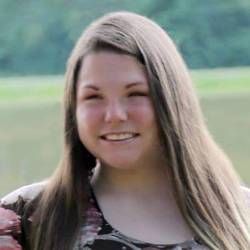Wiedemann-Steiner Syndrome
A mother’s intuition is rarely wrong. Mandy Hughey noticed some things were different with her second child, daughter Alex. “As a mom, my concern was, was she healthy?’” Because of her eating habits and slow growth, Mandy was worried that her baby wasn’t thriving.
Visits to their hometown pediatrician and bloodwork didn’t provide any conclusive answers. By age 2, when Alex wasn’t talking, she began early intervention to address some of the developmental delays. At age 6, a doctor noticed that Alex’s tonsils were unusually large causing swallowing issues that eventually led to surgery to have them, and her adenoids, removed. As a teenager, she developed stomach issues and had an irregular menstrual cycle. She had a small stature, standing at 4’5”.
At age 14, Alex was referred to Dr. Bhuvana Sunil, an endocrinologist at Children’s of Alabama. Dr. Sunil eventually recommended genetic testing for Alex, and that’s when the Hugheys met Dr. Anna Hurst, at the time a resident, but now an associate professor in the Department of Genetics at the University of Alabama at Birmingham. The initial genetic testing didn’t provide any definitive answers, and because Alex was otherwise healthy, Mandy relied on her faith. “God made me healthy,” Alex said. “She’s just the way God made her. It’s just not meant for us to know,” Mandy said. “When it’s time, God will lead us to where we need to be.”
Fast forward to 2017. Genetic testing had advanced tremendously since Dr. Hurst first met Alex, and she wanted to take another chance with her. “Dr. Hurst was genuinely interested in Alex and never forgot about her three years and hundreds of patients later,” Mandy said. A second round of testing was cost prohibitive for the family, but Dr. Hurst assured them the expense would be covered through a research grant, specifically Children’s of Alabama Genome Sequencing (COAGS) study funded by Children’s of Alabama and the Board of Trustees. Mandy was hesitant at first, knowing she and Alex didn’t want to be let down again. “If you don’t get your hopes up, then you’re not disappointed,” Mandy said. Those concerns were cast aside the day Dr. Hurst called with news: Alex had a rare condition called Wiedemann-Steiner Syndrome (WSS).
“We went so long not knowing. I knew my daughter was different. I didn’t care that she was different, but I couldn’t help her medically until we knew what we were dealing with,” Mandy said. “I didn’t really care what the name was, but I wanted to know what she had so that I could provide the best possible medical care for her. If not for Dr. Ashraf and Dr. Hurst, we probably never would have had answers.”
Dr. Hurst explained to them that on one copy of Alex’s KMT2A gene, a DNA letter was supposed to be a “C” but instead it was a “G.” Those affected with Wiedemann-Steiner Syndrome may have developmental delays, sleeping difficulties, feeding and digestion complexities, unusual facial features, short/petite stature and decreased muscle tone. The Wiedemann-Steiner Syndrome Foundation reports that only a few hundred patients have been documented worldwide.
With a diagnosis, Alex and Mandy now know what symptoms or signs that might require medical attention. For instance, some people with WSS have heart issues, so Mandy set up a cardiologist appointment for Alex, something she wouldn’t have done otherwise. Sure enough, doctors found an abnormal heart rhythm that had previously been undetected. And at age 17, doctors diagnosed Alex with gastroparesis, a stomach condition common among those who have WSS.
Dr. Sunil consulted with Dr. Ambika Ashraf, the division director of Pediatric Endocrinology and Diabetes, who has experience caring for other children with WSS. As Alex prepares to transition to adult heath care, she and Mandy have met a variety of specialists, some of whom have never treated a person with WSS. “Her new endocrinologist has already been in touch with Dr. Ashraf. That means a lot to me. You’re taking the initiative to learn about my baby,” Mandy said, as 21-year-old Alex smiles.
Alex hopes to use her voice to teach others about WSS. “I just want to help other families, and let them know that everything is going to be OK,” she said. “I don’t want them to be upset about the diagnosis.” She doesn’t like the word ‘disease,’ because in her world, she’s perfectly normal. “My mom has never hidden anything from me about my diagnosis. It’s a diagnosis but it’s not stopping me from doing anything,” Alex said.
They are both grateful that Dr. Hurst never stopped exploring the possibilities. “She is the most kind-hearted person I’ve ever met,” Alex said. “She’s like family to me because she helped me. She’ll always be in my heart.”







